

Battle Royale 29 v04 - Read Battle Royale 29 Online - Page 11. Acta bioethica - Home Page. Virus kills breast cancer cells in laboratory. HERSHEY, Pa. -- A nondisease-causing virus kills human breast cancer cells in the laboratory, creating opportunities for potential new cancer therapies, according to Penn State College of Medicine researchers who tested the virus on three different breast cancer types that represent the multiple stages of breast cancer development.
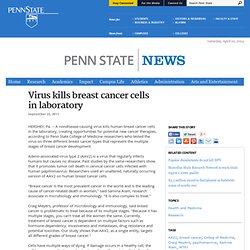
Adeno-associated virus type 2 (AAV2) is a virus that regularly infects humans but causes no disease. Past studies by the same researchers show that it promotes tumor cell death in cervical cancer cells infected with human papillomavirus. Researchers used an unaltered, naturally occurring version of AAV2 on human breast cancer cells. "Breast cancer is the most prevalent cancer in the world and is the leading cause of cancer-related death in women," said Samina Alam, research associate in microbiology and immunology. "It is also complex to treat. " Cells have multiple ways of dying. "We can see the virus is killing the cancer cells, but how is it doing it?
" Essential Secrets of Psychotherapy: The Healing Power of Clinical Wisdom (Part One) What really happens in psychotherapy ? The answer to that question is complex. And depends in part on the particular type of psychotherapy one seeks. But one thing that psychotherapy can, in my experience, convey to patients are certain tried and true, essential secrets to living a more rich, fulfilling, meaningful, contented, creative, balanced and psychologically healthy life. Acta bioeth. - Números disponibles. Hospital le lleva 3.000 gatos a una paciente con cáncer. Essential Secrets of Psychotherapy: The Healing Power of Clinical Wisdom (Part Two) In my previous posting (Part One), I presented, in no particular order, seven secrets of psychotherapy based on what we call "clinical wisdomarticle continues after advertisement.
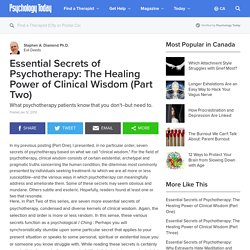
" For the field of psychotherapy, clinical wisdom consists of certain existential, archetypal and pragmatic truths concerning the human condition, the dilemmas most commonly presented by individuals seeking treatment--to which we are all more or less susceptible--and the various ways in which psychotherapy can meaningfully address and ameliorate them. Some of these secrets may seem obvious and mundane. Others subtle and esoteric. Hopefully, readers found at least one or two that resonate. Here, in Part Two of this series, are seven more essential secrets of psychotherapy, condensed and diverse kernels of clinical wisdom. Procrastination and the power of presence. Article continues after advertisement We all have a little boy or girl living within. Humans have limitations.
"Not out, but through. " Educating the 21st Century Physician: What Do We Risk Losing? {*style:<b> It doesn't have to be like this... </b>*}Normally my posts are not so formal. But what I am writing about here is a formal problem; literally, this essay aims to be an explication of some of the problems affecting the the , if you will - of how we as a nation conceptualize our physicians. What I write might seem accusatory so I have included references to show that I am not alone in these concerns. Nevertheless, my goal is not to put anyone on the defensive. I should add here that while this post is not about the current health care reforms being enacted, I do in fact believe that the reforms being proposed by the current administration have the strongest chance of preserving the best values of the traditional patient-doctor relationship.
Here’s a fact. Nevertheless, the chance to hear people’s stories, to sit in the privileged position of understanding and whenever possible relieving suffering; that honor still can and should outweigh the drudgery of bureaucratic oversight. Acta bioethica - Bioética y calidad en la atención de primer contacto y de salud pública. Acta Bioethica 2011; 17(1): 31-36 Bioética y calidad en la atención de primer contacto y de salud pública Bioethics in primary health care and public health quality Bioética e qualidade na atenção primária em saúde pública Octaviano Domínguez Márquez1, Carolina Manrique Nava2. Do We Need a DSM-V? Below is an editorial (with the above title) taken from the newsletter of the Society of Biological Psychiatry and written by its editor, Stephen M.
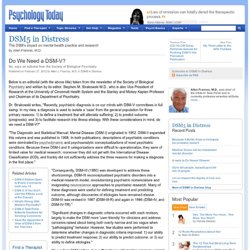
Strakowski M.D., who is also Vice President of Research at the University of Cincinnati Health System and the Stanley and Mickey Kaplan Professor and Chairman of its Department of Psychiatry. Dr. Strakowski writes, "Recently, psychiatric diagnosis is on our minds with DSM-V committees in full swing. In my view, a diagnosis is used to isolate a 'case' from the general population for three primary reasons: 1) to define a treatment that will alleviate suffering; 2) to predict outcome (prognosis); and 3) to facilitate research into illness etiology. Is Our Society Manufacturing Depressed People? Our society is in the throes of a virtual epidemic of depression.
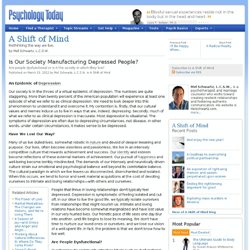
The numbers are quite staggering. More than twenty percent of the American population will experience at least one episode of what we refer to as clinical depression. We need to look deeper into this phenomenon to understand it and overcome it. My contention is, firstly, that our cultural values and memes induce us to live in ways that are, indeed, depressing. Noticias médicas - Medicina narrativa, un recurso para humanizar la profesión. Alejandra Rey Esta nota es sobre la palabra.
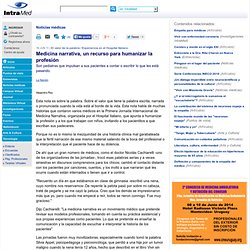
Noticias médicas - Sobre el triunfo de la ideología-MBE en la práctica clínica. 30° Congreso de la Sociedad Española de Medicina Familiar y Comunitaria, Valencia 2010 Por F.
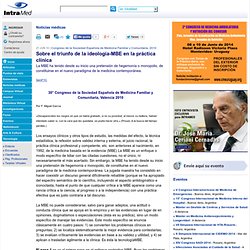
Miguel García «Desaparecidos los rasgos en que se había grabado, si no su juventud, al menos su belleza, habían intentado saber si, con la cara que les quedaba, se podía hacer otra.» (Proust, A la busca del tiempo perdido.) CPR: Charisma, Professionalism & Rapport on the Gold Coast, Australia. For those of you that joined me (okay, it’s for those who didn’t either), here’s a quick recap of the talk I gave at Robina Hospital in the Bond University Education and Research Centre (read about the event here).
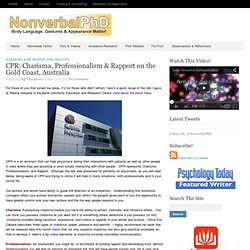
CPR is a an acronym that can help physicians during their interactions with patients as well as other people in roles where they are assisting or even simply interacting with other people. CPR represents Charisma, Professionalism, and Rapport. Although the talk was presented for primarily for physicians, as you will read below, being aware of CPR and trying to utilize it will help in many situations, both professionally and in your social life. Our actions and words have ability to guide the direction of an interaction. Understanding this emotional contagion effect (our actions and words ‘spread’ and ‘affect’ the people) gives each of you the opportunity to have greater control over your own actions and the the way people respond to you. Acta bioethica - La política focalizada en el programa de vacunación contra el Virus del Papiloma Humano en México: aspectos éticos.
La formación humanista y médica del doctor Ernesto "Che" Guevara: sus aportes al desarrollo médico social de Cuba* Índice Anterior Siguiente Introducción Es un honor extraordinario participar en nombre de Cuba, mi país, en este Foro "Pensamiento Humanista y Médico de Eugenio Espejo y Ernesto 'Che' Guevara" que la Facultad de Ciencias Médicas de la prestigiosa Universidad de Cuenca ha organizado como homenaje en reconocimiento a los aportes prestados a la humanidad, por estas dos grandes figuras de la historia de Nuestra América, en el desarrollo científico y humanista, en la formación de los médicos, así como en la promoción de los más altos valores humanos en las nuevas generaciones de profesionales de la medicina.
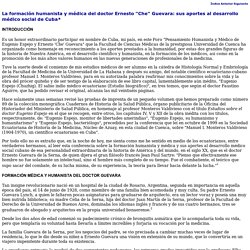
Tuve la suerte desde el comienzo de mis estudios médicos de ser alumno en la cátedra de Histología Normal y Embriología de la Facultad de Medicina de la Universidad de La Habana y después su amigo, del notable científico ecuatoriano-cubano profesor Manuel I. Formación médica y humanista del doctor Guevara Los cubanos también sentimos sus vientos de renovación. Fig. 1. Sartre JP. Atul Gawande: How do we heal medicine?